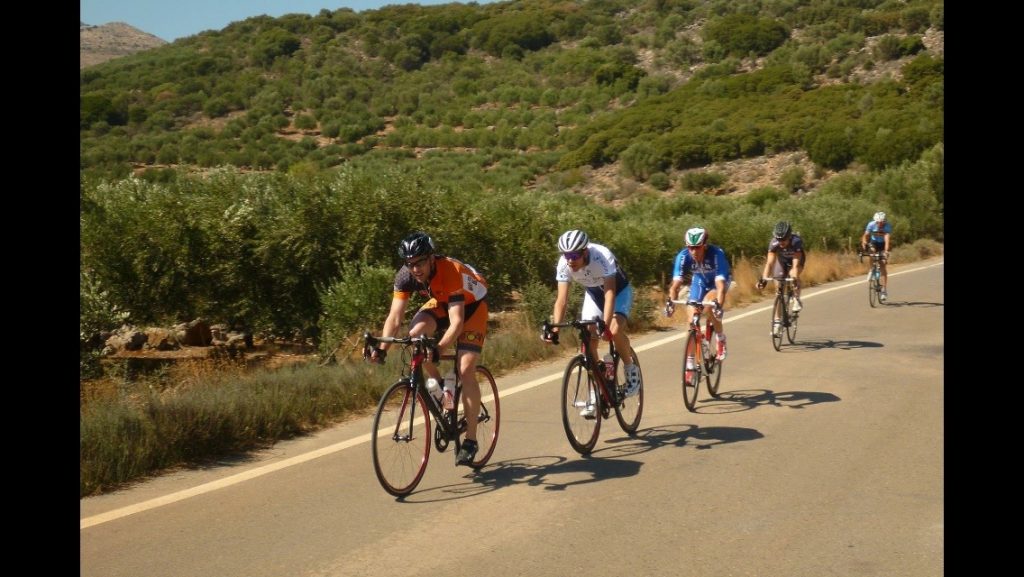Balancing Training – Work – Family and Everything Else!
Where to Start?
No matter what your training goal is, balancing all the elements of your life is tricky! Whether it’s a partner, kids, busy job, social commitments, or anything else…not many people have the time to train like a pro athlete. Perhaps more importantly, most people don’t have the time to recover as well as a pro athlete.
Long rides, long base miles might be impossible if you only have 5-8 hours to train each week. Some pro’s ride that long in a single ride!! Clearly, that’s not possible for most time-crunched athletes…certainly not something I can do!!
The Good News
The good news is that you can get great fitness from a training programme of 5-8 hours.
With this amount of training you could easily cope with:
- A 2-3 hour race
- You could easily complete a long Sportif of 6-8 hours.
- Competitive in Time trials up to 100 miles
- Or anything in between
If you are smart with your training there isn’t much you can’t complete.
There are a few things you need to consider to get the most out of your time, but it can be done. You need a good plan and you need your plan to balance within your busy life.
In this post we’ll cover some ideas of how to fit your training in, keep everything else balanced and avoid the common mistakes of time-crunched athletes.
There is Hope – Here’s What to do:
Sustainable Training Gets the Best Results:
Your plan needs to be sustainable. If you try and do too much, pressure will build and eventually something has to give! The biggest gains in fitness come from sustainable, consistent and frequent training. If you plan well and manage your training within your busy life, this is possible.
Avoiding Mistakes is almost more important than anything Else:
Over enthusiasm and the feeling you should always be pushing because you don’t have much time are massive traps that have to be avoided.
Don’t get sucked into miracle intervals and fads. Have a good plan and be flexible when life gets too busy.
Monitoring
Most people are good at monitoring their fitness. But monitoring and being aware of your energy and mood off the bike is key to keeping things in balance. Make sure you have enough left in the tank to take the kids to the park, or whatever else it might be.
If energy is getting low, maybe it’s time to take an extra day off…better one missed session now than a missed week because you got totally exhausted and got ill!
Communication with Others
It’s good to make sure others know what you are doing and why. You don’t have to bore them with all the details, but making sure they understand helps A LOT!!
There will also come a time where you need help…for example to eke out extra training time at crucial points of your build to an event or something like that…so make sure you are building the brownie points when you can and use them when you have to.
What NOT to do!!
- Don’t think because you only have a few hours, ‘every training session has to be really hard!’
This is the biggest mistake people with limited time make. The simple truth is no one can train like this sustainably. You simply cannot recover fast enough with this approach so you end up digging a big hole for yourself. You either end up overtraining and burning out, plateauing and not reaching your potential or getting illnesses all the time.
You need a mix of different intensities and a training plan that is balanced enough to allow you to sustain it for a long period of time. This is where the big gains are.
- Don’t think just because you only have 30-60 minutes it won’t do anything!
This overlaps with my previous point. Just because you only have 40 minutes to fit in a ride on the turbo it’s not pointless and you don’t have to go flat out to achieve something!!
There’s great benefit in just getting on and riding, if it’s supposed to be an easy day, keep it easy. Save your hard efforts for the hard days.
Even short, easy rides have a good impact on your fitness…DO NOT underestimate them!! It’s a nice stimulus that will create adaptation and as part of a balanced programme have a massive benefit.
Missing these rides because you think they won’t do anything is a huge mistake, as is making them too hard.
- Don’t Believe in the ‘Magic Intervals’
Magazine and internet articles will tell you their intervals will ‘Boost your fitness instantly’ or be a ‘shortcut to massive fitness gains’!! Never believe them!! They may quote scientific articles, but in truth, they are commonly done on untrained students who will respond to just about any training.
Good, long term fitness gains come from a more patient, structured approach that doesn’t have to take all your free time.
…It can be done with limited time and a busy life…

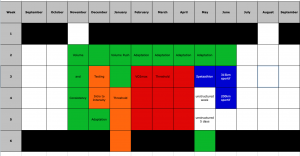
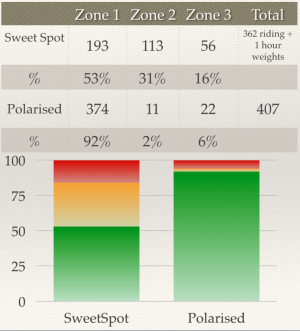
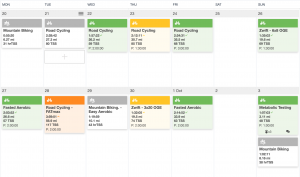
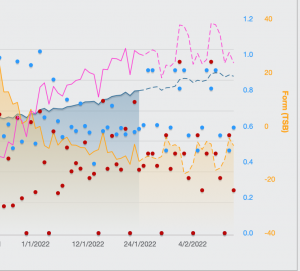
Strategies That Work
When you are time-crunched it is about focussing that attention on what will help you best get to your goal, so exactly what to do is goal dependent.
HOWEVER, there are some universal truths of endurance training that will help you improve:
These are:
- Training Frequency
- Training Volume
- Training Consistency
- Occasional High-Intensity Training
So What Does That Mean for ME??
By focussing on these elements of your plan you will get the biggest gains possible. For example, training 3-4 x per week, every week, with one longer ride and one ride with a bit of intensity…THE GAINS WILL COME!
These are the fundamentals of training. The added benefits of training specifics, relative to your goal, will add quite a bit, but it’s very individual. That’s where guidance from a coach will help you. A coach can maximise your gains specific to your event and help you avoid mistakes that set you back.
Key Take Home Messages
1. Set Out a Plan
It’s good to set out a plan of where you can train in the week. Starting with the times when the training will have the least impact on anything or anyone else.
For example, my wife takes the kids to Greek School on a Saturday morning. Leaves enough time for about a 2:30 ride. So my long ride is planned in there. No time lost with Anna and the boys and I get my longest ride of the week.
It might mean training early sometimes, or training late sometimes, commuting 1-2 x per week. It could be anything, but plan out.
Be a little conservative…don’t fill in every spare minute with training See what your options are and make a conservative plan.
2. Monitor Your Energy and Mood
This leads on from the filling every spare minute. with training. When you are starting out, be conservative. Monitor your energy, make sure you have enough for your other commitments.
If your training is going great, but you never see your family or are too tired at work…THAT’S NOT BALANCE!! All areas of your life need to be in balance or something will suffer…if one thing starts suffering it will eventually affect everything else.
You can monitor this with simple online tools on Training Peaks or using HRV (heart rate variability). See how you are getting on and be honest. If you are digging a hole, stop digging and re-evaluate
3. Specificity
The universal truths of consistency, frequency and good intensity control will build the base of any endurance athlete.
The next step is to adapt the subtleties of the training to maximise the specific gains you need for YOUR EVENT.
When you are time-crunched, good testing can save you some time and effort. If you know your zones precisely, you will get more from the training you do.
I use Metabolic Profile Testing with my athletes and it has the benefit of maximising training gains and also showing you how you are improving, building confidence and keeping you on track…no wasted time!!
4. Be Organised
It’s good to set out a plan of where you can train in the week. Starting with the times when the training will have the least impact on anything or anyone else.
For example, my wife takes the kids to Greek School on a Saturday morning. Leaves enough time for about a 2:30 ride. So my long ride is planned in there. No time lost with Anna and the boys and I get my longest ride of the week.
It might mean training early sometimes, or training late sometimes…plan it out.
ALSO…make the training as easy to complete as possible. If it’s an early turbo session, prepare the bike, your clothes, your drinks and anything else you need THE NIGHT BEFORE…you don’t have much time, so make the most of what you do have and minimise the mental effort of getting on the bike.
5. You Only Get Fitter from the Training you can Recover From
This is a big one. Sometimes you can go hard, sometimes you can put in more hours. But be careful of the other side of the equation.
Training <————–>Recovery
If I had to…IF I HAD TO…I could train 20 hours a week. I could get up early, I could train twice on a few days and ride long twice on the weekend…I’d be really fit…RIGHT??
NO!!
The reason it wouldn’t make me fit is that I couldn’t recover from that level of training. I can’t get off the bike eat and sleep!! I have a job, I have to run around after the kids, and any other number of jobs that have to be done every day in ‘normal’ life.
There’s no way I could dedicate the recovery time you would need to absorb that amount of training. You have to balance the training and recovery equation.
6. BE PATIENT!
Have a good plan and be patient. Trust the process and allow your fitness to build. Most people who don’t get the gains they want is not because of lack of time. It’s because they pushed too hard and got ill or injured, or annoyed. their spouse and had to back off to make up for it.
BE PATIENT; find a sustainable level of training and allow consistency to build. You need balance in all areas of your life to allow consistency to grow, start within yourself and see how it goes…only increasing things when you successfully balance what you are doing.
Also, be patient with yourself when things don’t go to plan. Be flexible and don’t go chasing missed sessions. Sometimes there’s an easy way to fit an extra session, sometimes you just have to let it go and move on to the next one.
Be patient with yourself and your training.
A coach can really help with making the most of the training in your individual circumstances. No two situations are exactly the same. Get the fundamental pieces of the puzzle in place, but get some help or advice on your specific needs and enjoy the best performances you are capable of.
Any questions, feel free to comment below or email coach@summitcyclecoaching.co.uk
Make a Plan
With a coach, you are part of a team. Together we make a plan tailored to your goals and your lifestyle
The Work
You still need to do the work. But we’ll be with you, keeping you motivated and on track.

